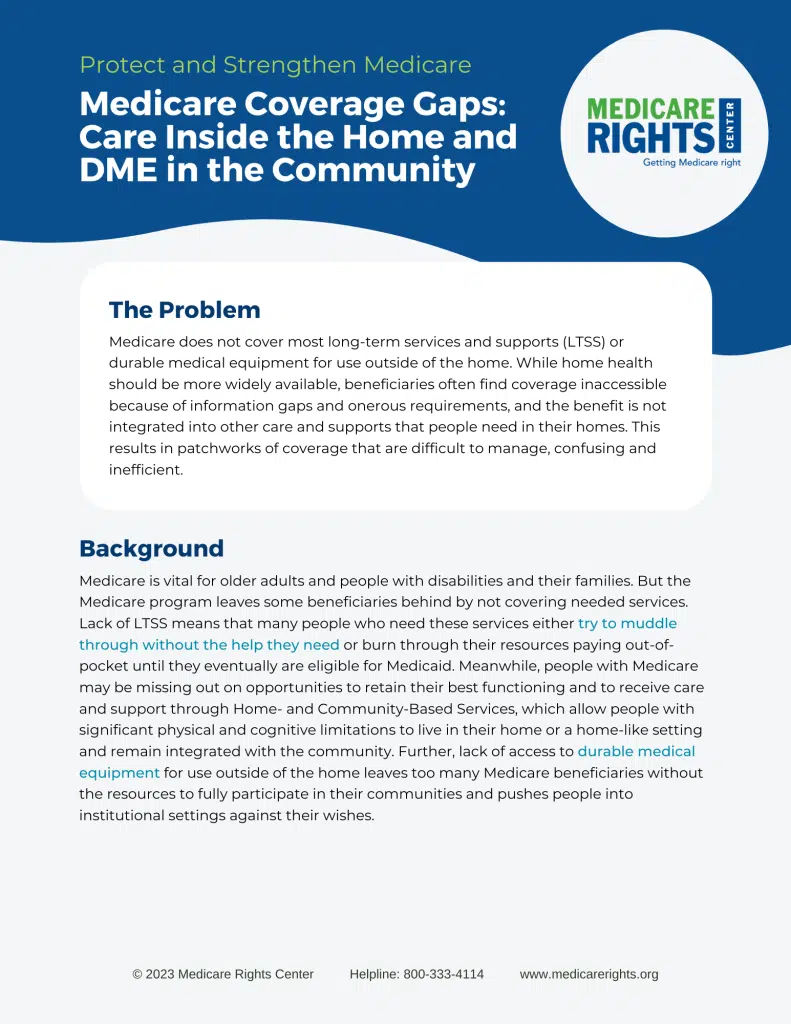Like other Medicare enrollees, people who are dually eligible for Medicare and Medicaid can choose to receive their Part A and Part B benefits through Original Medicare (OM) or from a private Medicare Advantage (MA) plan. Some who select MA may have access to a Dual Eligible Special Needs Plan (D-SNP) which is an MA plan exclusive to people enrolled in both programs. In this fact sheet we examine D-SNPs’ potential to improve integrated care and the beneficiary experience.
Read More
While most people are automatically enrolled in Medicare Part B because they are collecting Social Security benefits when they become Medicare-eligible at age 65, a growing number are not. Many are working later in life and deferring retirement; in 2016, only 60% of 65-year-olds were taking Social Security, compared to […]
Read More
Medicare does not cover most long-term services and supports (LTSS) or durable medical equipment for use outside of the home. While home health should be more widely available, beneficiaries often find coverage inaccessible because of information gaps and onerous requirements, and the benefit is not integrated into other care and supports that people need in their homes. This results in patchworks of coverage that are difficult to manage, confusing and inefficient.
Read More
Medicare eligibility translates into meaningful gains in health equity. But the COVID-19 pandemic in particular has demonstrated that racial, ethnic, gender, LGBTQ+ status, disability status, and income disparities in health outcomes and access to care remain.
Read More
Medicare does not cover many of the essential services that older adults and people with disabilities need in order to live healthy lives. In addition to the direct impacts in terms of beneficiary well-being, gaps in access to these services can bring on or worsen other health concerns. Furthermore, this lack of coverage puts Medicare out-of-step with most private insurance and Medicaid which reflect a more modern understanding of patient needs and the interconnected nature of the human body.
Read More
The proliferation of Medicare Advantage (MA) plans and the variation across plans makes enrollment decisions based on a beneficiary’s individual circumstances overly complex, resulting in sub-optimal choices or unwillingness to shop for coverage.
Read More
Medicare’s Low-Income Subsidy (LIS) program (also called “Extra Help”) can be a lifeline, helping low- and moderate-income beneficiaries pay for coverage they would not otherwise be able to afford. But aspects of the program are woefully outdated, making it difficult for low- and moderate-income beneficiaries to access the help they need.
Read More
Current Medicare policies expose low- and moderate-income beneficiaries to excessive out-of-pocket costs. For those who qualify, the Low-Income Subsidy(LIS) program (also called “Extra Help”) can be a lifeline, helping them pay for Medicare coverage they would not otherwise be able to afford. But accessing this program presents challenges of its own. The application process is complex and fragmented, and the eligibility requirements are woefully outdated. As a result, many who need this assistance aren’t able to get it.
Read More
The Medicare Part D appeals process is an essential safety valve, allowing access to needed prescription medications—such as those that are not on the plan’s formulary, or are subject to high cost sharing, when formulary or lower cost alternatives are not appropriate. However, Part D enrollees often struggle to successfully navigate this overly complex, multi-step, process, and it can also prove burdensome for pharmacists, plans, and prescribing physicians. This can result in delayed access to needed prescriptions, abandonment of prescribed medications, reduced adherence to treatment protocols, worse health outcomes, and higher costs for the patient and the Medicare program.
Read More
While most people newly eligible for Medicare are automatically enrolled in Part B—because they are collecting Social Security retirement benefits at or before age 65—a growing number are working later in life and deferring their Social Security benefits. Unlike those who are auto-enrolled, these individuals must make an active Medicare enrollment choice, taking into consideration specific timelines and existing coverage. If this transition is mismanaged, individuals new to Medicare may face lifetime late enrollment penalties, higher health care costs, gaps in coverage, and disruptions in care continuity.
Read More








